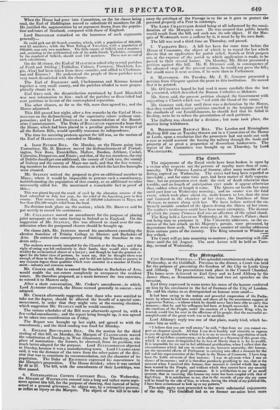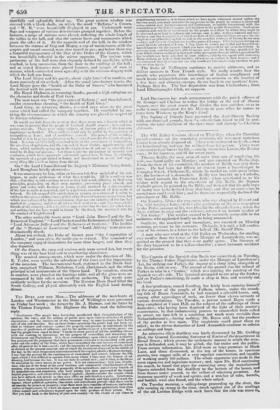b e SiftetrapaTil.
CITY REFORM FESTIVAL.—This splendid entertainment took place on Wednesday, at the Guildhall. Previous to the dinner, a Court was held for the purpose of presenting the freedom of the City to Lords Grey • and Althorp. The presentation took place in the Council Chamber. The boxes were delivered to Earl Grey and to Lord Althorp by Sir James Shaw, as Remembrancer; who read two set speeches on the occasion.
Earl Grey expressed in warm terms his sense of the honour conferred on lain by his enrolment in the list of freemen of the City of London. He said his claims to so distinguished an honour were small— It had been owing to the zealous and powerful cooperation of the Parlia- ment, by whom he had been assisted, and above all by the unanimous support of a generous Nation,—without which be should never have been able to carry this measure,—that he and his colleagues had been at length successful. It was to the exertions of the People, under the sanction of a beneficent King, who' he trusted, would live for ever in the affections of Isis people, that the successful cc- complish ment of the great work was to be ascribed.
Lord Althorp's reply was one of that plain, manly kind, which be- comes him so well-
" I believe that you are well aware," he said, "that from me you cannot ex- pect an eloquent speech. All that I can do is frankly and sincerely to express to you the great satisfaction which it is to me to receive the approbation of such a body of my fellow-countrymen—to be admitted as a freeman of this great city, which is not more hiticguislmed for its love of liberty than it is for its wealth. It is impossible for me not to feel additional gratification, when I reflect that the circumstances which led you to confer on me, however unworthy, this honour, are the successful efforts of Parliament in carrying into effect a measure for the full and fair representation of the People in the House of Couinione. I have long been the feeble advocate of that measure. I was its advocate when I saw no chance of its success; and it is therefore peculially gratifying to me, that at the moment when I received this honour, that measure is earned which has long been wanted by the People, and without which they cannot have any secunty for the continuance of good government. It is satisfaction to me or no smali account, that in receiving this honour my name has been coupled with , that of Earl Grey. It is satisfaction to me, that in the records of your city my name will be found by the side of him, to whom, during the whole of my political life, I have been accustomed to look up as my pattern."
The noble party next proceeded tO the more substantial enjoyments of the day, The Guildhall had on no former occasion been more tEareftilly and splendidly 'fitted up. • The great eastern window was covered with •a• black shade, on which the word " Reform," a Crown, and " W. 11," were beautifully displayed in gas. Underneath were flags and weapons of various deseriptions grouped together. Below the banners, a range of mirrors were placed, reflecting the whole length of the tables in the hall, and also the various busts and monuments which
grace the sides of it. At the opposite end of the hall, in the window between the statues of Gog and Magog, a cap of maintenance, with the
sceptre and sword crossed, were also traced in gas; and below them was a beautiful transparency of the Star of the Order of the Garter, which was beautifully reflected in the mirror opposite. The various com- partments of the hall were also elegantly defined by gas-lights, which reached, in long succession, from the floor to the vaulting of the hall; and at stated distances were placed banners, and images of men in armour, which contrasted most agreeably with the crimson drapery with which the hall was hung. The Lord Mayor and his guests, about eight hundred in number, sat down precisely at six o'clock.- After the usual introductory toasts, the Lord Mayor gave the "health of the Duke of Sussex," who honoured the festival with his presence. His Royal Highness, in returning thanks, passed a high eulogitun on the character and deeds of Earl Grey. The next toast was "the great cause of Reform ;" and then followed, amidst tremendous cheering, " the health of Earl Grey."
Lord Grey, in returning thanks, reverted once mOre to the great cause which had called the company together. lie concluded by no- ticing the circumstances in which the country- was placed in respect of its foreign relations— He would not hide frino the meeting that there never vase time in which it was more important that th: pmple of England should assume a thin ond im- posing attitude. There wure 1111111V sllbjVCiS or foreign policy of the iirst-rate importance undecided. These subjects cull only be settled by the ; . ertainty of tranquillity at home, and if contidenve Lbruad. The power of tl:; country, founded as it is in polco, ought never to he o:.orei,c41 save for the honellt of man- kind. It Lever cre,h1 he folly 1.7,ercised without the lestoration of tranquillity, the cm;ation of agitation, and the removal it those doubts, apprehensions, and fears, which naturally si,ring up in the mitnis of weak and are as natu!.ally fes- tered by ill-disrsed person,. Let them refute the predictions of aearchy and confusion, whirh their opponoots ,,aid would spring- from lIefqrm, iv showing the spectacle of a people united at home, and lien:mined to resent and repel every thing like iastilt or injury from abroad.
• On 4' the Lord Chancellor and his Majesty's Ministers" being drunk, Lord Brougham briefly observed— It was unnecessary for him, either on his own behalf or on behalf of his col- leagues, to make professions of what tin y would do. All he would say was this,—that they wauld continue to act as ti; v had acted, adhering to their own principles, procetaling on their own maxims, preserving peaco ahread, and peace aud order with freedom at home, Ii tilt resolved by :t dua ixecution of the law to make it respectea, and by a judicious amendment of it to make it beloved. The felt unspeakal,!:, sAtiscartion la mating as a citizen of London to celebrate the success of this rise', which of its,11. was of intmenso impui.tance, but which was enhanced III; tho consideration, that not one violation of the law had marked its progress, mind tit it all who wished well to it—and they were ail the
friends of the country—felt it c,,.11idt'nt expectat km that ti, the whole law, and nothing but the law, would in future be the fixed, the unaiterA rule for the conduct of lioglislimen.1
The other noticeable toasts were " Lord John Russell and the Re- formers of Etigland," "Lord Plunkett and the Reformers of Ireland," and "Lord Advocate Jeffrey and the Reformers of Scotland." The healths of the " Marquis of Lansdowne" and " Lord Althorp" were also en- thusiastically drunk. About ten o'clock, the Duke of Sussex gave "the Corporation of London ;" and soon after, the pale guests retired. The remainder of the company enjoyed themselves for sonic time longer, and then they also departed.
Of the dinner, the soup and venison only were served hot, but every thing was of the best kind and in overflowing abundance. The musical arrangements, which were under the direction of Mr. E. Taylor, were worthy the splendour of the feast and the importance ; of the occasion. The instrumental band, stationed in the North Gal- lery, comprised Willman, Nicholson, Card, Mackintoelt, and the other principal wind instruments of the Opera band. The vocalists, sixteen



























 Previous page
Previous page